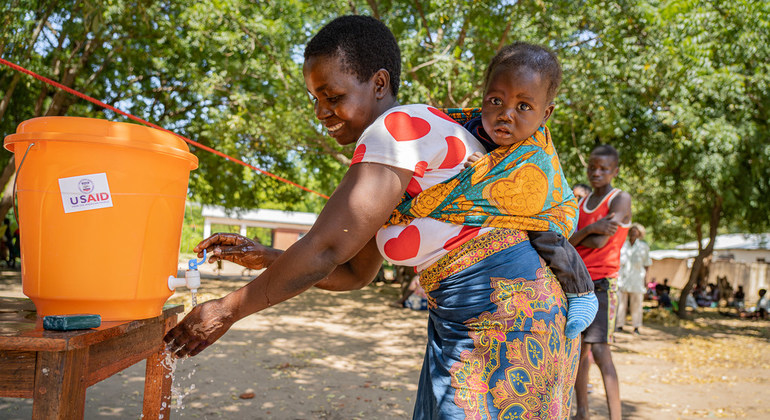COVID-19 is known to be particularly dangerous for those with underlying health conditions and, in the African Great Lakes nation, a significant proportion of the population fall into that vulnerable category.
Around a million adults are living with HIV/AIDS, and approximately the same number of children have been orphaned by the disease. Many others are suffering from a range of infectious diseases, such as hepatitis A, malaria, rabies, schistosomiasis (a disease carried by freshwater snails), and typhoid.
Maria Jose Torres is UN Resident Coordinator in Malawi, the senior United Nations development official there, and she is warning that COVID-19 could have a disastrously high toll: “Even a fairly low number of cases could overwhelm the health system, cause food shortages, and reverse the path of progress the country has been on in recent years.”
Ms. Torres adds that a systematic approach is needed to avoid that scenario. “We’ve got to make sure that people have the supplies and knowledge they need to stay safe”, she added.
The race to get out the hygiene message
“Where infectious diseases are concerned, hygiene and sanitation are paramount”, says Robson Kayira, District Environmental Health Officer for Mchinji district. “Handwashing is particularly critical during the COVID-19 pandemic.”
UNICEF, with support from partner UK Aid and others, is working to deliver water, sanitation, and hygiene (WASH) supplies, so communities are prepared. So far, over 24,000 units of chlorine powder drums, water buckets, water testing kits, laundry soap, hygiene education materials, and portable toilets have been distributed to emergency treatment units in four districts.
However, educating the population is just as important as providing the supplies, as Ms. Torres explains: “WASH supplies are beneficial only if people use them properly. That’s why the UN in Malawi is working to make sure people learn exactly what they need to do to keep themselves, their families, and their country, safe”.
Printed information about COVID-19 is being distributed throughout rural Malawi by UN Children’s Fund UNICEF, the World Health Organization (WHO), the Food and Agriculture Organization (FAO), and other UN agencies, with support from the European Union and UK Aid.
In the Chiradzulu district, for example, 1,000 posters have been distributed to health facilities, agricultural centres, households with pregnant women, and local nutrition and hygiene care groups. “The posters help me share the message to my care-group members”, says Rhoda Sauka, a care-group promoter. “Then they spread the message to other households and communities.”
Livelihoods at risk
“In March last year, floods washed away my crop field and demolished my house”, says Alinafe Nhlane, a 33-year-old mother and subsistence farmer in Muona Village. Ms. Nhlane’s property and land were hit last year by Cyclone Idai, which burst dams, flooded crops, and left nearly 90,000 people homeless or displaced in Malawi.
“Because of the flooding, I harvested only four bags of maize, which took me up to early July. Since then I’ve been doing piecemeal labour to feed my two children”, she says (the most recent addition to her family, Albert, is just 18 months old).
Ms. Nhlane, a subsistence farmer catching up from the losses of last year, and in need of food before the harvest season, is typical of millions of Malawians. All this, just as Covid-19 looms.
To address the immediate need, the World Food Programme (WFP) has distributed cash to almost 350,000 vulnerable people in the country’s most food-insecure districts, with support from the US and UK governments. Ms. Nhlane received about US $33, “which I will use to buy maize, cooking oil, beans, and fruits for my children”, she says.
At distribution sites, people receive not just cash, but also lifesaving information about the virus. “People put that information to use right away,” says Caroline Allan, District Health Officer for Nsanje. “they stay at a safe distance from one another in line, and wash their hands before they get assistance. That way, the instruction gets backed up by some hands-on practice.”
Nobody can do it alone: getting community leaders onboard
The UN in Malawi – which is working with the Ministry of Health and community leaders to decide on the best ways to share prevention messages – insists that strong partnerships with community groups play a vital role in the fight against the pandemic. “The UN can’t do it alone”, says Ms. Torres. “Government can’t do it alone. People need to hear messages from those they know and trust.”
Paramount Chief Kyungu, whose tribal territory includes two districts next to Tanzania, is one of the community leaders who has taken part in consultations with the UN and the authorities, on the best ways to communicate about Covid-19.
“Our borders with other countries are very busy,” He says. “Movement across borders is heavy with traders, workers, and refugees. After all, people need to transport food, make a living, and escape violence in their homelands”. At the same time, says the Chief, “We need measures to address the spread of COVID-19. Together, as one, we can fight the virus.”





